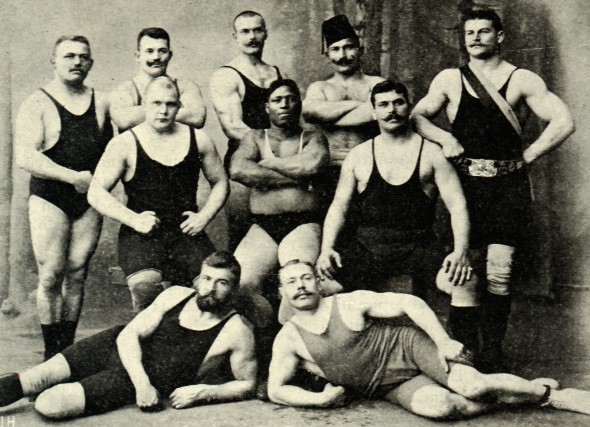Wednesday, January 14, 2015
anti-definition of cathedral manliness
By
Dale Asberry
at
January 14, 2015
0
comments
![]()
Labels: bushido , Cathedral , culture of competence
neologism: the midgley effect
By
CNu
at
January 14, 2015
0
comments
![]()
Labels: evolution , gain of function , What IT DO Shawty...
tony blair pretending he doesn't understand what russell brand is on about...,
By
CNu
at
January 14, 2015
0
comments
![]()
Labels: 2parties1ideology , Ass Clownery , deceiver , elite , establishment
Tuesday, January 13, 2015
necropolitics: a war zone of the mind playing itself out on the streets
By
CNu
at
January 13, 2015
12
comments
![]()
Labels: American Original , clampdown , institutional deconstruction , killer-ape , Race and Ethnicity
necropolitics: freedom fries any semblance of fair and uniform application...,
By
CNu
at
January 13, 2015
0
comments
![]()
Labels: just-us , Race and Ethnicity , Rule of Law , What IT DO Shawty...
necropolitics: freedom fries structure, meaning, self-worth and dignity...,
By
CNu
at
January 13, 2015
6
comments
![]()
Labels: Ass Clownery , doesn't end well , niggerization , not a good look , shameless
Monday, January 12, 2015
necropolitics: poor gary younge, panem's got his tongue....,
By
CNu
at
January 12, 2015
0
comments
![]()
Labels: niggerization , sum'n not right
year of shattered illusions...,
alt-market | It has been said that during the economic collapse of the 1930s that the Great Depression was a depression only for the 30 percent of people that had lost everything. For the employed and the financially secure, the depression was much like any other time. This is the point at which we stand today in the collective mindset. With nearly a third of the U.S. population kicked off the unemployment rolls and approximately half the country dependent on a government check of some kind for their survival, the current depression is only now beginning to feel like a depression for anyone. The soup lines have received a fresh candy coating of EBT cards and welfare payments, but the illusion is finally fading, and this should be of great concern to us all in 2015.
By
CNu
at
January 12, 2015
0
comments
![]()
Labels: global system of 1% supremacy
yeah.., no.., - sum'n faux
By
CNu
at
January 12, 2015
4
comments
![]()
Labels: accountability , The Straight and Narrow
Sunday, January 11, 2015
the establishment has worked since _________ to create a common political identity against grievance
By
CNu
at
January 11, 2015
2
comments
![]()
Labels: agenda , elite , establishment , Livestock Management , niggerization
not feeling je suis charlie...,
By
CNu
at
January 11, 2015
0
comments
![]()
Labels: The Straight and Narrow
panem's ruthless fakery transparent in the light of living memory history...,
By
CNu
at
January 11, 2015
0
comments
![]()
Labels: clampdown , Living Memory , What IT DO Shawty...
Saturday, January 10, 2015
necropolitics: from interrogation to extermination in a climate of perpetration
By
CNu
at
January 10, 2015
0
comments
![]()
Labels: agenda , deceiver , elite , establishment , Rule of Law
rule of law: petraeus never gave sworn testimony...,
By
CNu
at
January 10, 2015
0
comments
![]()
Labels: Obamamandian Imperative , Rule of Law
necropolitics: sleep&eat ain't gone do a dayyum thing...,
By
CNu
at
January 10, 2015
0
comments
![]()
Labels: Ass Clownery , Rule of Law , you used to be the man
Friday, January 09, 2015
rule of law: child-murdering overseer timothy loehmann operating a few points shy of IQ-75
By
CNu
at
January 09, 2015
8
comments
![]()
Labels: Ass Clownery , killer-ape , Rule of Law , What IT DO Shawty...
invasion of america
By
Dale Asberry
at
January 09, 2015
9
comments
![]()
what message was this terrorist sending
By
Dale Asberry
at
January 09, 2015
3
comments
![]()
rule of law: proxy war on the impoverished 15% no longer needed for non-existent manufacturing jobs...,
By
CNu
at
January 09, 2015
0
comments
![]()
Labels: agenda , American Original , elite , establishment , not gonna happen...
rule of law: who feels incompetent and inhumane overseer loehmann needs to be underneath a jail somewhere?
By
CNu
at
January 09, 2015
0
comments
![]()
Labels: accountability , Rule of Law , you used to be the man
H.R. 6408 Terminating The Tax Exempt Status Of Organizations We Don't Like
nakedcapitalism | This measures is so far under the radar that so far, only Friedman and Matthew Petti at Reason seem to have noticed it...
-
theatlantic | The Ku Klux Klan, Ronald Reagan, and, for most of its history, the NRA all worked to control guns. The Founding Fathers...
-
Video - John Marco Allegro in an interview with Van Kooten & De Bie. TSMATC | Describing the growth of the mushroom ( boletos), P...
-
Farmer Scrub | We've just completed one full year of weighing and recording everything we harvest from the yard. I've uploaded a s...




